The long road to healing: Trauma survivor's story continues
Workaholism: A most respectable sin
Highlights from the 13th Session of the General Conference

The long road to healing: Trauma survivor's story continues
Workaholism: A most respectable sin
Highlights from the 13th Session of the General Conference
Editorial Board
Adviser and Publisher
Dr Anthony Goh
Chairperson, Council on Communications
Communications Manager
Lynn Tan
Managing Editor
Alvin Tay
Editor
Lianne Ong
Communications Executive
Kathrynn Koh
Sub-editors
Lucy Cheng
Janice Khoo
Tan Chiu Ai
Elliot Soh
Proofreaders
Kenneth Lee
Christabel Tan

The official monthly publication of The Methodist Church in Singapore. Published material does not necessarily reflect the official view of The Methodist Church. All Scripture quoted is based on the English Standard Version unless otherwise stated.
70 Barker Road #06-04 Singapore 309936 6478-4793 | 6478-4763
methodist.org.sg/message www.methodist.org.sg
communications@methodist. org.sg
fb.com/Methodist.SG
@methodist.sg
@methodistsg
Have something to say or share? Email us at communications@methodist.org.sg
Contents
/ Bishop’s Message / / News /
2 13th Session of the General Conference: Episcopal Elections and highlights
7 Russia-Ukraine and Israel-Palestine wars take centrestage at the World Methodist Conference 2024
11 Covenant Community Methodist Church marks its 30th year with 30 projects and more to bless the community
/ Feature /
14 Why should churches care about mental health?
18 The long road to healing
21 Methodist Social Principles: Are John Wesley's words to modern Methodists about community life still relevant today?
/ Opinion / 24 Soundings: A most respectable sin
/ Outreach / 27 Mental health in the mission fields
30 Counselling saved my life
/ Relationships / 32 At The Well
36 You & Your Family:
How not to make your in-laws your out-laws
/ Worship /
39 Dealing with mental health through worship
/ People /
41 Taking ownership of my community

It's Time to Prioritise Mental Health in the Workplace.
This is the theme adopted for this year's World Mental Health Day (10 October 2024).1 Recent years have generated more awareness of the importance of mental health. Today, mental illness afflicts many more of us than we used to think. We would be wise to acquaint ourselves with the different ways to promote stronger mental health in our families and friends. 2
The workplace often presents us with many challenges which stress us. Saul was king of Israel when the neighbouring people of Philistia were an ever-present security threat. It is hardly surprising that the Bible records how King Saul would often be troubled in his spirit. The Bible goes on to say that the music from David's lyre helped to remove Saul's troubled spirit.
And whenever the harmful spirit from God was upon Saul, David took the lyre and played it with his hand. So Saul was refreshed and was well, and the harmful spirit departed from him.
~ 1 Samuel 16:23
There are many ways to heal one's spirit, and one way is through music. It is one of the ways in which God brings healing to our troubled spirits.
It also has a way of reaching minds that seem to be unresponsive. Even in the area of modern medicine, music is recognised as an important form of therapy. May the Methodist tradition of music continue God's good work of healing and help in this troubled world.
Almost 2,000 years ago, the Lord Jesus Christ already taught his disciples important ways to
promote mental health and cope with bouts of mental illness.
Come to me, all you who are weary and burdened, and I will give you rest. Take my yoke upon you and learn from me, for I am gentle and humble in heart, and you will find rest for your souls.
~ Matthew 11:28–29 (NIV)
In times when I feel mentally weak and unwell, it helps me to read and hear the advice and invitation of the Lord Jesus to learn gentleness and find rest for my soul.
May we as a Church help one another and our neighbours find mental health and well-being for our weary souls.
1 https://wmhdofficial.com/
2 Consider suggestions in this issue of MM, or go to https://www.who.int/westernpacific/activities/promotingmental-health
Lianne Ong is the Editor of Methodist Message / Photos by
Retirement age, disaffiliation with UMC and clergy rules on alcohol consumption among key issues debated at 13th Session of the General Conference
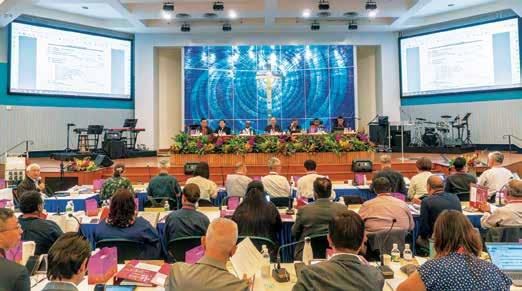
At the recent 13th Session of the General Conference (GC) held from 2 to 6 September 2024, Rev Philip Lim was elected the next Bishop of The Methodist Church in Singapore (MCS). Bishop-Elect Lim, currently the Pastor-inCharge of Kum Yan Methodist Church under the Chinese Annual Conference, was elected on the seventh ballot. He will be consecrated on 6 December 2024, taking on the role of spiritual leader for more than 45,000 Methodists in 46 churches across Singapore. He succeeds Bishop Dr Gordon Wong who is retiring after serving as Bishop for a term of four years.
Upon being elected, Bishop-Elect Lim said, "The work of the Bishop is immense; the responsibility as the spiritual head of the Methodist Church is great. The task now is to inspire the Church to the mission that God has called us to and to help the Church grow in spiritual holiness. All this work cannot be done by one person—we need all the churches to come together. Let us all work together, and as the Bible says, let us spur one another on towards love and good deeds!"
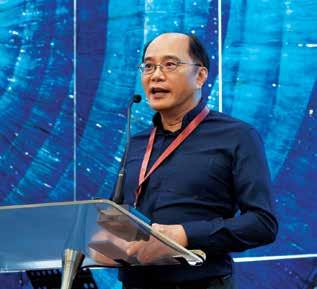
Rev Lim is currently Pastorin-Charge of Kum Yan Methodist Church. He is also the Chairperson of the Board of Ministry at the Chinese Annual Conference (CAC). He was posted to Cambodia in 2004 as a missionary with the Methodist Missions Society (MMS) where he served for seven years, laying the foundation and growing MMS' missional ministry in its early days there, and later returned to the MMS home office to serve as Area Director for Cambodia before becoming MMS' Executive Director from 2012 to 2018. In 2019, he returned to pastoral ministry at CAC. Rev Lim is married to Lydia Ng and they have an adult daughter, Olivia.
(below left)
Sacrament of Holy Communion on Day 1 (below right)
Praying for Bishop-Elect Philip Lim (centre)
Over five days at Faith Methodist Church/ Queenstown Chinese Methodist Church, the GC delegates reviewed a total of 30 petitions, and Bishop Dr Wong chaired the sessions each day. Three key issues are highlighted here:
Retirement age of Presidents and Bishop Leading up to the Episcopal Elections, the GC delegates debated on the issue of whether to raise the retirement age of the Bishop and Annual Conference Presidents from 65 to 70. Because the retirement age determined the list of eligible elders for the Episcopal and Presidential Elections, it would also determine whether the incumbent Bishop and Presidents would be eligible to take on a second term if elected, as they had crossed the age limit under the current rules.
A robust debate took place on Day 1 of the GC during the legislative session where several petitions regarding this issue were reviewed. Views that were put forth ranged from the stability of MCS if the top leadership were to change at one go, to the ethics of changing the rules right before elections. A related issue was when to implement the new rule should the retirement age be raised, whether with immediate effect or at the next session of the GC, and whether it would apply to both Episcopal and Presidential Elections at the same time.

At the plenary session on Day 2, the GC delegates voted to raise the retirement age of the Bishop and Presidents from 65 to 70 and implement this at the start of the 14th Session of the GC in 2028.
These legislative changes set the stage for the Episcopal Elections on Day 2. The key contenders were Rev James Nagulan (ETAC), Rev Philip Lim (CAC) and Rev Kenneth Huang (TRAC), with Rev Lim eventually garnering more than twothirds of the valid votes.
Following the watershed legislative changes earlier this year by the United Methodist Church (UMC) to remove the ban on the ordination and appointment of "self-avowed practising homosexuals", and to broaden the definition of marriage to include "two people of faith, an adult man and woman of consenting age, or two adult persons of consenting age into union with one another", it was not surprising that there were petitions submitted to disaffiliate from UMC given the latter's departure from biblical teachings.
MCS has historical links to UMC, which is based in the United States, as UMC is MCS' founding Church. However, these
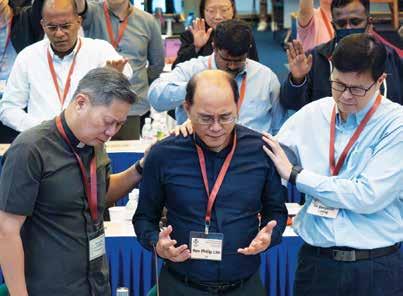
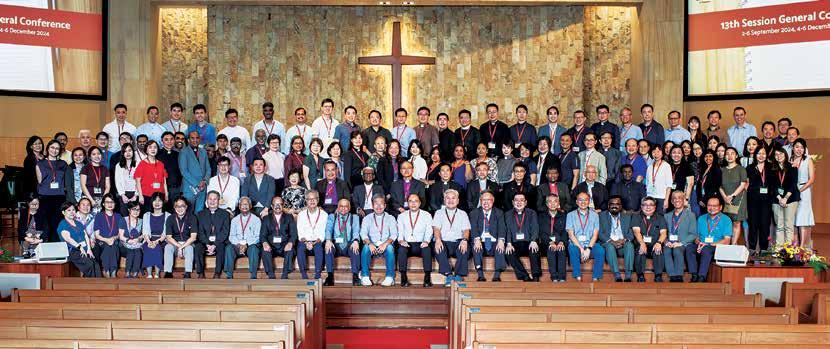
historical links do not bind MCS to any UMC rules or policies because MCS, while affiliated, is an autonomous Church and determines its own rules which are recorded in MCS' Book of Discipline (BOD).
Of pertinence was the "Covenant of Cooperation" that was signed between UMC and MCS (while it was still joined with The Methodist Church in Malaysia) in 1968 and any changes to alter the covenant must be done with mutual agreement. Mr Kim Seah, who has chaired the Discipline Revision Commission (DRC)—which oversees the work of the BOD—for the last 28 years, led the delegates to consider their arguments in terms of the "what, why and how" of disaffiliation.
The "what" saw the house debate on the definition of the term "disaffiliation". Mr Kim Seah advised that the term had to be defined carefully because MCS holds both formal and informal ties with UMC. The formal ties included, among others, accepting UMC membership certificates and the transferring of pastors between UMC and MCS, while the informal ties had more to do with daily practices, such
as use of UMC-produced Bible study material by Disciple Agency and the use of The United Methodist Book of Worship as a reference for crafting liturgies.
Therefore the "how" of disaffiliation, i.e. the way disaffiliation will take place operationally, needed more thought.
Mr Kim Seah recommended that a deferment of the rest of the petitions relating to UMC was in order, until a decision had been made on the petition to discontinue the affiliation at the GC Special Session in July 2025. All voted in favour of deferment.
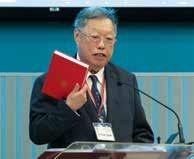

A petition that proposed a change to a long-standing rule of alcohol and tobacco abstinence by clergy and local preachers was reviewed. The rule in the
(right above)
K2s from Faith Methodist Preschool performing a song item during Methodist Preschool Service's report
(right below) Fellowship during meal times
BOD dates back to the 1920s, when the Temperance movement was strongly led by Methodists in America.
It was argued that the essence of the rule was to encourage dedication and prohibit behaviours that would damage the influence and reputation of the local preacher; the prohibition should therefore be against drunkenness, rather than a blanket ban on alcohol.
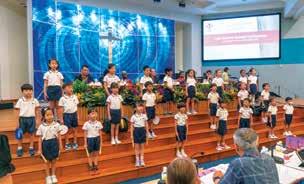
(below left)
Mr Anton Moses, Chairperson of the Council of Episcopacy
(below right)
Jeffrey Lim, General Conference Secretary, ensured the smooth running of the daily sessions (bottom) Taking a vote
Those who supported the petition largely felt that holiness should not be equated with the consumption of alcohol. Furthermore, since holiness was exemplified by Jesus, and Jesus himself created and drank wine (at the wedding at Cana), it would be difficult to justify why a pastor could not. The rule seemed incongruent with the times, where the younger generation did not think complete abstinence was relevant anymore.
However, there were also several counter arguments. One was that ordained ministers took this vow as a symbol of the highest ideals of Christian ministry. Allowing the consumption of alcohol could be problematic in defining permissible limits. Pastors who had to counsel those with drinking habits could find it difficult to set a positive example.
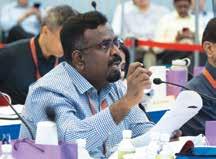

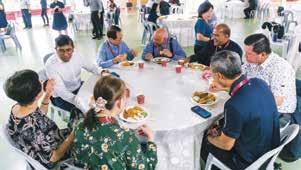
Given that the issue had both theological and practical dimensions, the current wordings in the BOD would require refinement so as not to stumble anyone. The house voted to refer this matter to the DRC in consultation with representatives from the Boards of Ministry and the Boards of Laity of the three Annual Conferences.
As the 13th Session drew to a close, Mr Kim Seah reminded all that the BOD is the "good and hard work" of the General Conference and asked for delegates to defend this work if ever they heard "a lie to the contrary".
"For a lie left repeated, may become the truth," he said.
Bishop Dr Wong called for a vote of thanks to the DRC in the last quadrennium and the house gave a standing vote of approval.
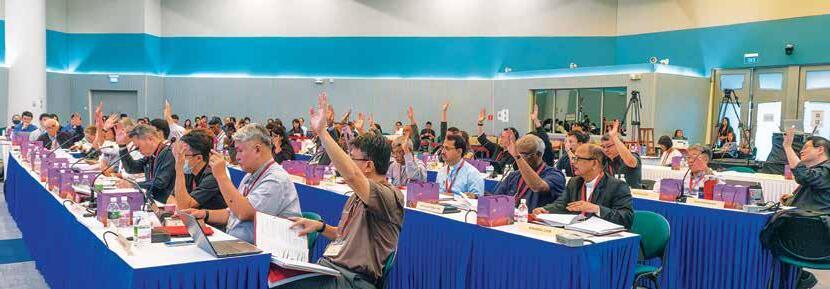
The following persons were elected to these key positions of the General Conferen ce:
The Secretary of the Trustees
Mr Guan Yeow Kwang
Assistant Secretaries of the Trustees
Mr Anton Moses, Mr Kim Seah
General Conference Secretary
Mr Jeffrey Lim
General Conference Treasurer
Mr Melvin Dineshraj
General Conference Assistant Treasurer
Mr Nicholas Au-Yong
Chairperson, Finance and Administration Council
Mdm Daisy Pang
Chairperson, Discipline Revision Commission
Ms Aurill Kam
Chairperson, Council on Archives and History
Rev Dr Andrew Peh
Chairperson, Council of Governance
Mr Steven Seah
Members of the Council of Governance
Chairpersons of the Boards of Governance from CAC, ETAC and TRAC; Ms Susan Goh, Mr Kang Kok Kwan and Mr Colin Chen
Chairperson, Disciple Agency
Mr Philip Oh
Chairperson, Methodist Missions Society
Mr Collin Tan
Lay and Ministerial Members of the Judicial Council
Substantive: Rev Dr Gregory Goh, Dr Leong Sieu-Hon Benjamin, Mr Anton Moses, Rev Raymond Fong and Dr Cheah-Foo Fung Fong
Alternate: Rev Andy Goh, Mr Tan Boon Chok, Dr Stephen Yeo, Rev James Nagulan, Mr Selvathurai Rajamani, Mrs Jessy Birgediah, Rev Reuben Ng, Rev Tay Li Ping and Mr Charis Gabriel Lim



Still don't know what the General Conference is and what it does? Watch this explainer video!


The WMC drew 1,200 delegates from all over the world

The 22nd World Methodist Conference (WMC) met in Gothenburg, Sweden from 13 to 18 August 2024. The WMC, a global gathering of the Methodist-Wesleyan family, is held every five years. However, the 2021 session was cancelled due to the Covid-19 pandemic, making this year's conference the first since 2016. The host was The Uniting Church in Sweden with support of the Danish and Norwegian United Methodist Church.
The Singapore delegation of Council Members and participants led by Bishop Dr Gordon Wong included the three Annual Conference Presidents, office holders from the General Conference, pastors, staff, leaders and members of Faith Methodist Church, Fairfield Methodist Church and Trinity Methodist Church.
The theme "On The Move" and its subthemes Migration, Pilgrimage and Guiding Lights, was fitting in the midst of new wars and many facing unrest or economic insecurity. Forced migration—a recurring theme since biblical times—was especially poignant as those facing wars were forced to settle elsewhere.
Dr Ivan Rusyn, President of the Ukrainian Evangelical Theological Seminary, gave a first-hand account on how the Russians had destroyed the seminary, and how the upheavals of war had changed the work of the seminary's staff.
A moving story he shared involved having to collect bodies from the morgue and using the
Russia-Ukraine and Israel-Palestine wars take centrestage at the World Methodist Conference 2024
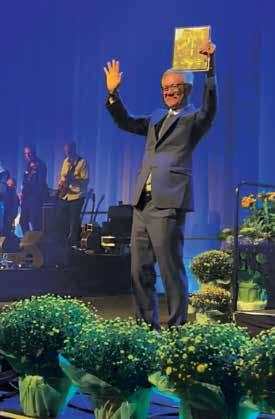

seminary bus to deliver them to the cemetery. "This is not the typical ministry of a church or seminary," Dr Rusyn said solemnly.
"I also conducted communion for soldiers. Some of those soldiers were having communion for the very first time, while others would be taking communion for the last time. But the Holy Spirit was most certainly present."
In these experiences, Dr Rusyn saw that the role of the Church in providing comfort was crucial and called for the Church to serve the community in better and new ways. Today the perception of the Church in Ukraine has changed from being "a cult" to being a positive presence, "because the Church has demonstrated solidarity and compassion, being with the people".
Dr Rusyn admitted that it was frustrating when well-meaning Christians advised him to forgive his enemies, especially if these Christians had not experienced the war
first-hand. However, although he was not ready to do so, he still aspired to forgive his enemies because of the example of Jesus: "I obey the commandments of Jesus because only he commands from the cross."
The commandment to love one's neighbour had taken on a new meaning as well. Dr Rusyn said, "Now, every Ukrainian is my neighbour, regardless of gender, religion or political affiliation. Where there is suffering, then there is my neighbour."
The sessions with Dr Rusyn were moderated by Bishop Christian Alsted, the NordicBaltic-Ukraine Area Bishop, who also received the World Methodist Peace Award 2023 at the Conference, in recognition of his work in Ukraine. After Russia invaded Ukraine in February 2022, Bishop Alsted, who is from Denmark, stepped up when it became impossible for Moscow-based United Methodist Bishop Eduard Khegay to provide oversight in Ukraine and neighbouring Moldova.
(above left) For the Parade of Ornaments, held during the first night's worship session, MCS Secretary of Trustees Mr Guan Yeow Kwang presented the book produced by MCS, John Wesley: The World, My Parish (above right) Bishop Dr Wong preached on the "Pilgrimage to Peace" on the second night

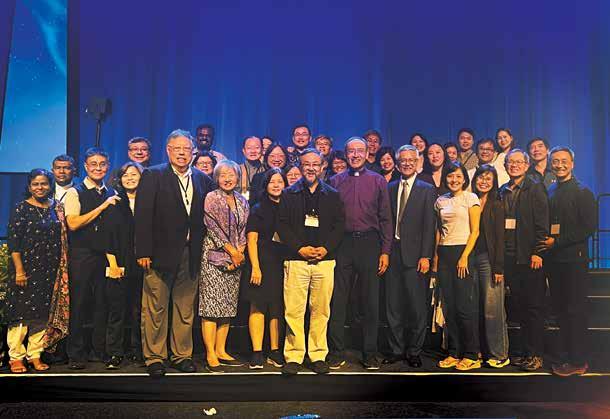
"I am honoured and deeply humbled to receive this [award] on behalf of the United Methodists in Ukraine and Christians in Ukraine," said Bishop Alsted. He also said that while he was able to return to his home country with peace, Ukrainians lived with the daily stress of war. "Right now, peace in Ukraine seems far away but we must practise peace— speak the truth in love, realise our own flaws, claim and practise freedom … and that day will come."
Two Palestinian Christian ladies, Areej Masoud and Lamma Mansour, shared about the plight of the Palestinians in Gaza during their session, "What is happening in the Holy Land?". Giving a historical backdrop to explain what has led to the conflict today, they highlighted the travel restrictions faced by Palestinians, which varied depending on where they lived. The inability to

meet freely and easily has had an impact on daily life and they fear the effect of eradicating family traditions over time.
According to them, "illegal Jewish settlements" had led to the forced displacements of the Palestinians and their becoming "second class citizens" in their own homeland. The "twostate solution" that is often suggested was not possible due to these Jewish settlements sprouting up all over the land where they were living.
The two speakers also spoke out against "Christian-Zionism", a view that is popular in many Christian circles which supports Jewish nationalism and the right of Jews to return to their "homeland". This belief, according to the speakers, has informed political views and policies in favour of Israel, which in turn hinder the peace process.
Russia-Ukraine and Israel-Palestine wars take centrestage at the World Methodist Conference 2024
In response to these sessions, Bishop Dr Wong said, "My understanding of Christian faithfulness was broadened as I listened to the stories of two Palestinian women living in the Promised Land, and how the so-called chosen people of God have filled their lives with despair and discrimination. As I listened to Ukrainian rector Ivan Rusyn, I could not help but be filled with empathy for Ukrainians who have lost their homes and loved ones. One can understand why he no longer feels any kinship with these whom he once regarded as Christian brothers."
Mr Guan Yeow Kwang, the Secretary of Trustees of MCS said, "I can't help but feel that in Singapore we are indeed living in a bubble, insulated from upheavals, injustice and sufferings that permeate the world. We should be very grateful but it is not enough. We need to be a more compassionate, generous and charitable people."
In this context, Bishop Dr Wong's clarion call for peace as one of the Conference keynote speakers hit the right notes. Preaching from Isaiah 59:7-8 and James 3:18, his sermon, "Pilgrims on the Path to Peace", was about Isaiah's vision of peace. The leaders in Isaiah's day were pursuing a "crooked path" to peace, deceiving people with what they claimed to be pursuing and praying for—what Habbakuk described as a "perverted justice". Through the story of The Grass Eater by Trevor Dennis, Bishop Dr Wong illustrated that the path to peace might require sacrifice and letting go of what one holds dear. Finally, Bishop Dr Wong reminded the congregation that God's path to peace is a path of peace.
The WMC can be attended by Methodists in Singapore and is not reserved for clergy or lay leadership. Anton Moses, who chairs the Council of Episcopacy (the Council under the General Conference that reviews the work of the bishop and attends to his well-being), said, "I was delighted and felt blessed to attend WMC. WMC was very meaningful in many ways and opened my eyes to the global perspective of our calling as Methodists. I want to encourage more youth and young adults to attend WMC in the future to learn and understand God's bigger plan for us Methodists."
On the sidelines of the Conference, members of the World Methodist Council met to vote in new council members and pass resolutions on matters concerning Methodists and Christians around the world. Mr Kim Seah, Assistant Secretary of the Trustees who also chaired MCS' Discipline Revision Commission up until recently, was elected into the Nomination Committee of the World Methodist Council.
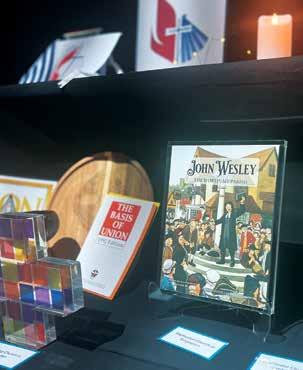
MCS' graphic novel about John Wesley's life was displayed with other symbolic ornaments from each of the participating churches
Cutting the anniversary cake: from left to right, Mr Leslie Wong, Lay Leader; Rev David Gwee, Pastor-in-Charge; Bishop Dr Gordon Wong; Rev Stanley Chua; and Mr David Koh, LCEC Chairperson
the
marks its 30th year with 30 projects and more to bless the community
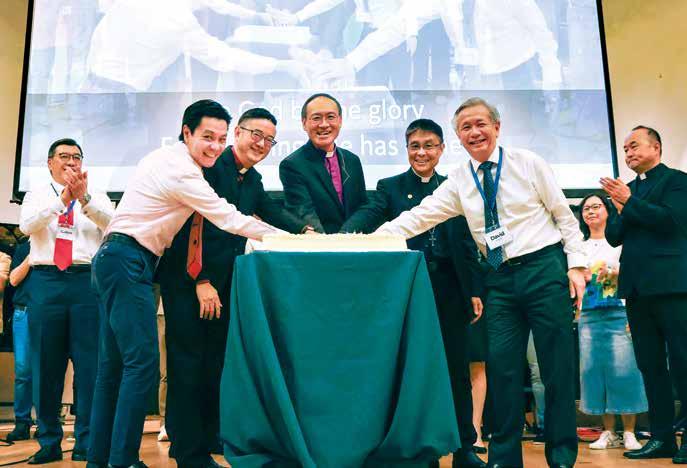
"I approached Mrs Tham when MGS had already relocated to Blackmore Drive. I asked her if she would be open to BRMC starting a church using the MGS chapel and she agreed. I mooted the idea because I realised that along Bukit Timah Road there was no Methodist church between Barker Road Methodist Church and Bukit Panjang Methodist Church. And it would be appropriate to plant a church at the new MGS."
~ Rev Dr Ngoei Foong Nghian , first Pastor-in-Charge of CCMC
In 1992, then chaplain of Methodist Girls' School (MGS) and Pastor-inCharge of Barker Road Methodist Church (BRMC), Rev Dr Ngoei Foong Nghian, was prompted to ask then
Principal Mrs Anna Tham about starting a Methodist church on the MGS campus when it moved from Mount Sophia to Blackmore Drive in Bukit Timah.
A Preaching Point was set up, and the inaugural chapel service took place on 10 October 1993.
Covenant Community Methodist Church marks its 30th year with 30 projects and more to bless the community

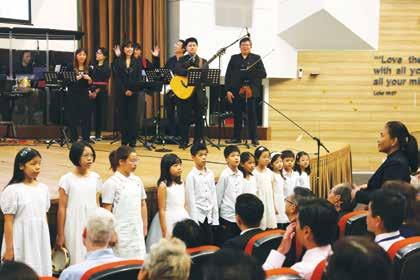
On 11 September 1994, the Preaching Point was officially established as a Local Conference, becoming the 16th church in the Trinity Annual Conference (TRAC) and Rev Dr Ngoei became its first Pastor-in-Charge. The church was named Covenant Community Methodist Church (CCMC), based on Ephesians 2:19-22, emphasising a community in covenant with God and each other.
CCMC's vision, "To Know God Deeply and Make Him Known Widely", continues to shape its mission, welcoming those in its nearby community to worship God, even as the commitment to MGS as its key ministry remains.
This year on 8 September, over 700 members and guests gathered at a Combined Worship Service to celebrate 30 years of God's faithfulness to CCMC. Bishop Dr Gordon Wong, TRAC President Rev Stanley Chua, TRAC Lay Leader Mr Henry Tan, TRAC Associate Lay Leaders Mr Liaw Chun Huan and Mr Poh Leong Berg, as well as MGS Principal Mrs Valarie Wilson and VicePrincipals, Mrs Koh Chern Ee and Mrs Diana Goh, were among the guests.
The celebration began with a heartfelt time of worship, bringing the congregation together in praise. Bishop Dr Wong shared an inspiring sermon, reminding us of the transformative power of love in overcoming evil. The joyful singing from the CCMC Combined Adults Choir—which included choir members from the 9 a.m. and 11 a.m. services, Men's Choir, Gospel Choir, Japanese Hallelujah Chorus and Covenant Kids Choir—brought warmth and a special sense of togetherness, adding a special touch to the meaningful Anniversary Service.
This year's theme, "Filled With The Spirit To Reach Out", was shown through the "30 Blessings" initiative—an initiative for church staff and members to run at least 30 projects designed to reach out to the local community and beyond. To date, more than 30 projects have been initiated. Projects included raising almost $30,000 to support the reintegration of ex-offenders, done in collaboration with The Helping Hand, a Christian halfway house. A fun fiesta held in August raised more than $18,000 for Sembawang Family Service Centre (SFSC).
From left to right: Mr Henry Tan, TRAC Lay Leader; Mr David Koh, LCEC Chairperson; Rev Stanley Chua; Bishop Dr Gordon Wong; Rev David Gwee, Pastor-inCharge; Pastor Rufus Chan, Assistant Pastor; and Mrs Valarie Wilson, MGS Principal (above right) CCMC Covenant Kids Choir blessing the congregation with their song

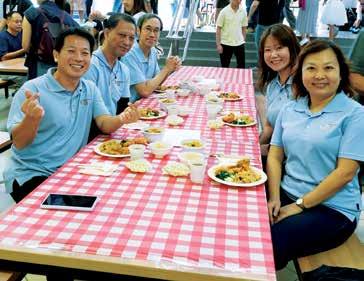
(above left)
Blest West Growth Group, the first Growth Group in CCMC
(above right)
Guests from Sembawang Family Service Centre, one of CCMC's key outreach ministries
There were also outreach efforts to worker dormitories to share the gospel as well as blessing low-wage earners within the neighbourhood with care packs containing daily essentials.
The activities under the "30 Blessings" banner will continue till the end of the year, where CCMC will also engage mission fields in Thailand, Cambodia and Nepal, re-affirming its support for YWAM Singapore and their missionaries in Asia.
(right top)
CCMC
Combined Adult Choir rendering praise to God through heartfelt song
(right middle)
Home Helpers Ministry gathering for a heartwarming fellowship lunch
(right bottom) Old and young celebrating together
Another significant project involves a gift CCMC will make to pupils of MGS and Fairfield Methodist School (Primary & Secondary): a revised edition of Sophia Blackmore in Singapore —a book about the founder of the two schools originally written by the late Bishop Emeritus Dr Theodore Doraisamy and published in 1987 by General Conference of the Women's Society of Christian Service (GC-WSCS) of The Methodist Church in Singapore. This new edition of the book is published with the support of the GC-WSCS.
"The many acts of love by our church family are surely a sign of the Holy Spirit actively working in CCMC. May
we continue to answer God’s call and continue reaching out in love in the years to come!" said Rev David Gwee, Pastor-in-Charge of CCMC.
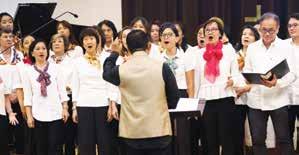


Rev Leow Wen Pin is the Chairman of the Koinonia Inclusion Network and Associate Pastor at Bethany Evangelical Free Church. He frequently writes on practical and pastoral theological issues such as disability and mental health. Access his writings at www.leowwenpin.com. / Photos courtesy of Stirling Campus and Leow Wen Pin
Over the last few years, I have facilitated an annual workshop on mental health for Methodist youths and young adults from Chinese Annual Conference (CAC) churches. 1 I always have a good time leading the workshops because the attendees are very engaged. And while running the workshops, I noticed some trends. On one hand, our young people are growing increasingly literate in mental health issues. On the other hand, more and more of them tell me that they themselves are experiencing poor mental health. This latter trend is not surprising. Many countries are experiencing a mental health crisis. "At least one in five, and in some parts of the world perhaps as many as one in two, people experience mental ill health during the course of their lifetime." 2 Estimates show that mental illness accounts for almost a third of all years lived globally
with disability. 3 In Singapore, in 2022, more than a person a day on average committed suicide, with poor mental health often being a significant contributing factor.
Suicide is the leading cause of death among youths (aged 10 to 29) in Singapore. 4 Just this year, then-Deputy Prime Minister Lawrence Wong stated that addressing mental well-being is a "key priority" on our national agenda. 5
Unfortunately, one more thing that my workshop attendees consistently tell me is that their churches are not engaging sufficiently with mental health. Indeed, it is lamentable that "many churches still consider mental health as outside the domain of their ministry." 6 To redress this, I would like to put forward several reasons why churches should care about mental health.
(below left)
Rev Leow with young adult participants of the mental health workshops at CAC's Finding Your Place 2024 programme
(below right) Methodist young adults presenting their ideas on how churches can deal with mental health issues
Before we discuss those reasons, we will first identify what we mean by the term "mental health". Mental health is not fundamentally about the presence or absence of mental illness (e.g. clinical depression). We should distinguish between having a mental illness and having poor mental health. While "people with mental health conditions are more likely to experience lower levels of mental well-being … this is not always or necessarily the case" (italics added). 7 This is because mental health is a complex phenomenon involving the biological, psychological, social, and spiritual dimensions of a person's life. 8 Even if a person has a mental illness (biology), they might still experience satisfactory levels of mental well-being due to medication (biology), therapy (psychology), and support from their church (spirituality) and family/friends (society). Such a holistic perspective on mental health helps us to better understand why churches should be concerned about mental health—as we shall see in the next section.
Having defined what mental health is, let us consider four reasons why churches should take mental health seriously.
Firstly, if our congregations reflect national trends, then poor mental health is already the lived experience of many of our church members. In 2019, some of my friends edited a volume entitled Mental Health and the Gospel Community , a collection of essays reflecting the stories of a wide swath of Christians in Singapore who struggle with mental health. Pastors and lay people, professionals and students, parents and children—no group was exempt. Thus, a church that turns a blind eye to mental health issues is choosing to be irrelevant to a critical need of their members.
Moreover, since the growth of mental health challenges is a reality in our broader society, this also means that there is a large window of opportunity for missions. There is tremendous potential for the Church in Singapore to minister the gospel of Jesus Christ through engaging with the mental health needs of our society. Indeed, the
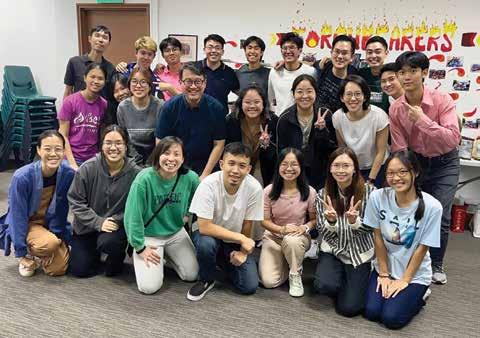

harvest is plentiful, if only our churches would take up the call to plough this mission field, both locally and abroad!
Secondly, churches must recognise that persons with mental health conditions often experience stigma and marginalisation. It is notable that a major mental health campaign in Singapore is titled "Beyond the Label". 9 When a person is diagnosed with mental illness, many deep-seated stereotypes attach themselves to that individual. I have personally experienced this. During my youth, when I struggled with depression—when I most needed help—I was labelled as " 孤僻 " (gū pì), i.e. withdrawn, anti-social, eccentric. This only served to further isolate me from those around me.
But the good news is that the Bible tells us that God loves those who are alienated and excluded! Deut 27:19; Ps 146:7; Isa 1:17; Zech 7:10; Luke 14:13–14; Jam 1:27—text after text in Scripture reveals God's heart for those whom society pushes to the margins. Thus, churches seeking to be faithful to God's character must take mental health seriously, for persons with mental illness are surely included in the Great Commission's command for us to make disciples of all people!
Thirdly, churches must recognise that Christian discipleship and mental health go hand in hand. While the terms "mental health" or "mental illness" are never used in Scripture, mental health is a frequent concern of Scripture. For instance, it is striking how many aspects of the fruit of the Spirit in Galatians 5:22–23 are essentially dimensions of mental well-being, e.g. joy, peace, patience, gentleness, self-control.
Moreover, psychological research also suggests that healthier forms of religiosity are correlated with better mental health outcomes. 10 Hence, if a church desires to be a disciple making church, mental health care must be a key aspect of its discipleship approach. Mental health literacy should also be regarded as a core ministry skill for leaders. Quantitative or qualitative measures of the mental well-being of a congregation would be meaningful indicators that contribute to the overall evaluation of a discipleship programme's effectiveness. (Do note, however, that having poor mental health should not be taken to indicate that a person is a poor disciple.)
Fourthly, churches must recognise that they are already involved in shaping the mental health of their members. As mentioned earlier, mental health is a complex phenomenon which is shaped by multiple factors, including our social and spiritual interactions with others. Thus, if a person is involved in a church, that community will affect that individual's mental health journey, whether they want to or not! Thus, the key question is: will churches influence their members' mental health in a healthy way or otherwise?
Sadly, ill-considered theologies or practices in churches can be disabling and contribute to poor mental health in their members. Lamentably, I have seen many examples of Christians mentally "burning out" due to a workaholic culture of excessive service in Singaporean churches. Thankfully, the opposite is also true: wise teaching, supportive culture and healthy practices in a church can contribute positively to its members' mental well-being.
Conclusion: A call to respond
Mental health missions; God's heart for the marginalised; Christian discipleship; a church's inextricable involvement in mental health—these are four major reasons why every church in Singapore should take mental health seriously. Mental health advocacy is not a fad. Jesus came that we might have life and have it to the fullest (John 10:10). Surely such an abundant life must include mental wellbeing. And while perfect mental health will not be possible before Jesus returns, we must still take mental health seriously in our faith communities. Indeed, every local church should be an oasis of sabbath and shalom in this chronically anxious world.
Edited by Jonathan Cho, Joanna Hor, Zhi-Wen Ng, Nicole Ong, Bernice Tan and Ronald J J Wong. Good News for Bruised Reeds 2. Singapore: Graceworks, 2019.
A collection of moving stories of Christians (including church leaders) in Singapore with mental health challenges. Includes an introduction to the theology of mental health written by the author of this article. A Mandarin translation is also available.
Struggling with God: Mental Health and Christian Spirituality
By Christopher C H Cook, Isabelle Hamley and John Swinton. London: SPCK, 2023.
This book, written by leading psychiatric professionals and theologians, provides an accessible introduction to mental health for Christians.
1 These workshops were conducted as part of the Finding Your Place (FYP) programme. The FYP was started in 2020 by the CAC Board of Youth Ministry with the objective of preparing youths and young adults to flourish in God's kingdom.
2 Christopher C H Cook, Isabelle Hamley and John Swinton, Struggling with God: Mental Health and Christian Spirituality (London: SPCK, 2023), 12.
3 Daniel Vigo, Graham Thornicroft and Rifat Atun, 'Estimating the True Global Burden of Mental Illness,' The Lancet Psychiatry 3, no. 2 (February 2016): 171–78.
4 Samaritans of Singapore, 'Highest Recorded Suicide Numbers in Singapore Since 2000,' July 1, 2023, https://www.sos.org.sg/media/press-releases/ (accessed 27 May 2024).
5 Yan Han Goh, "Mental Health a National Priority, Says DPM Wong; 28,000 More to Be Trained to Help in Community," The Straits Times (Singapore, 15 February 2024), https://www.straitstimes.com/ singapore/politics/mental-health-a-national-prioritysays-dpm-wong-28000-more-to-be-trained-to-helpin-community.
6 Edmund Ng, "Mental Health Literacy as a Ministry Skill: Basic Ways to Equip Church Leaders in Asia and Beyond," Lausanne Movement , 24 January 2023, https://lausanne.org/about/ blog/mental-health-literacy-as-a-ministry-skill. Accessed 22 July 2024.
7 World Health Organization, Mental Health Factsheet.
8 American Psychiatric Association Foundation, Mental Health: A Guide for Faith Leaders (Washington, DC: American Psychiatric Association Foundation, 2018), 13.
9 See https://www.ncss.gov.sg/our-initiatives/beyondthe-label. Accessed 23 July 2024.
10 See John Swinton, Spirituality and Mental Health Care: Rediscovering a 'Forgotten' Dimension , PTS (London: Jessica Kingsley, 2001), 33–34. For a more recent review of literature, see Larkin Elderon Kao, John R Peteet, and Christopher C H Cook, 'Spirituality and Mental Health,' Journal for the Study of Spirituality 10, no. 1 (January 2, 2020): 42–54.

Jane's story of her horrific abuse at the hands of her father was published in Methodist Message October 2023. While sharing her unimaginable ordeals was, to some extent, cathartic and empowering, her journey in search of healing and closure remained a dark and unending road. However, with family support and help from a therapist, the lights have turned on along her way. We hope this account of Jane's continuing quest to overcome her trauma will encourage our readers to be "more than conquerors" over their own adversities.


Scan the QR code to read Jane's earlier story from our October 2023 issue.
"We are not worthy so much as to gather up the crumbs under thy table, but thou art the same Lord whose property is always to have mercy."
This line from the Prayer of Humble Access kept replaying in my mind. If God can have mercy and forgive us who are imperfect and sinful people, shouldn't we learn to forgive others? Shouldn't I try to—but how can I ever—truly forgive my father? I turned to my youngest brother for help and he referred me to a professional counsellor.
Meeting the counsellor, Peter (not his real name), for the first time was not easy. I worried about how to begin telling him my painful story. Eventually I approached it by showing him my write-up which appeared in Methodist Message (October 2023)—the extent of my father's abuse surprised him as
my brother had only briefly said I had many unresolved issues with my father.
Peter expressed that I was strong and brave to carry on living normally and even caring for my parents and the aunts who raised me, when many others in my situation would have resorted to alcoholism, drugs or even suicide. He asked if I was going to file a formal report and take legal action against my father. I assured him I wasn't. All I want is closure: to be able to heal and move on. People may say I'm strong and brave, but affirmation isn't the answer I need.
Peter duly contacted my father, who agreed to meet him alone. Peter later said my father admitted to a quick temper and often venting his anger on me and my family, but he also made many negative comments about us. Peter asked my permission to

reveal to him later the main reason for the mediation, and I agreed.
At their second meeting, Peter confronted my father about the abuse. He reported that it went something like this: "I asked him if whatever you had shared was the truth. Your father remained silent for a very long time. Then he started hyperventilating and seemed unable to speak. I talked to him and managed to calm him down. He then asked for some time as he needed to speak to your mother. He claimed this was so long ago and he couldn't recollect much."
After that, my husband began accompanying me to my sessions with Peter, sitting through them with me. Peter forewarned us to be prepared that my father might deny the abuse. I was filled with even greater anxiety, but I continued to pray for the Lord's guidance and intervention.
When my mother knew what was happening, she told me that she didn't want to participate in the mediation and would continue to pretend to be ignorant of everything, in particular, the abuse, as she was afraid that my father would walk out on her if she stood up for me. Both Peter and my brother insisted that she had to be involved. Finally, my brother managed to convince her to meet Peter.
My brother accompanied my mother to meet Peter without my father's knowledge. She told Peter about her life with my father and her own personal struggles. She acknowledged that I had told her about the abuse a long time back and she believed me because she knew my father's vices. At this point, my father had not yet said anything to my mother.
He did so about one month later. My mother said he broke down in tears while confessing what he had done. He sought
her forgiveness. Then she had to persuade him for many days, to repent and face the consequences of all his wrongdoings. Thus, my father went to Peter and confessed to the abuse. Peter asked him to pen down a statement.
I was also asked to write an account of what had happened to me, and to my family over the years.
The mediation took place in the afternoon of Good Friday, 2024. In church that morning, I committed it to God and placed all my fears at the foot of his cross. Arriving at Peter's office, I was still filled with anxiety when I remembered Isaiah 41:10, "Fear not, for I am with you; be not dismayed, for I am your God; I will strengthen you, I will help you, I will uphold you with my righteous right hand."
Peter asked each of us to share our own purpose for being there, beginning with me. Where I was seated, I was able to fix my eyes on a blank wall and imagined there, on the wall was Jesus on the cross, dying for our sins. "I'm here for my own healing and closure, and not for revenge," I said.
When everyone had stated their purpose, Peter projected my father's statement on the wall and asked him to read it aloud. It shocked me that he could remember the ways in which he manipulated me during our car rides, but I was also sad that he omitted so much of his wrongdoings.
I was told I could let my husband or brother read out my statement, but I chose to read it myself as I felt I couldn’t burden them. It was difficult for me to begin as tears overcame me immediately. My husband and mother, seated beside me on each side, held my hands tightly. There was some silence after I had finished reading, as everyone was in tears.
I have heard your prayer; I have seen your tears. Behold, I will heal you.
~ 2 Kings 20:5
Peter asked my father what he thought was the best thing to be done. My father apologised profusely to both my husband and me for his abuse of me in the past, as well as all his verbal abuses towards my family. He said he was grateful I didn't report him to the authorities, as he could not imagine himself in prison at his age. Everyone else also had a chance to speak, and did. The mediation concluded with Peter advising my father to learn to manage his anger and seek his help if he needed it.
Since the mediation, we have attended family gatherings again. My father is
noticeably trying to change his behaviour towards me and my family, speaking in a kinder, more loving manner. I tell myself, this is just the beginning of the long road to healing.
I thank the Lord for being my hiding place throughout my painful life, and I'll always be grateful to my husband and my brother. There are still days when I feel weighed down. Although I've forgiven my father, I'm still praying to be totally relieved of this burden. All I can continue to do is lean on the Lord for his comfort and peace. To God Be The Glory!



Rev Dr Chiang Ming Shun is a lecturer in Church History at Trinity Theological College (TTC). He is an ordained minister with the Trinity Annual Conference (TRAC) of The Methodist Church in Singapore and is currently attached to Kampong Kapor Methodist Church.

Are
still relevant today?
Every Christian aspires to obey God, avoid evil and do good. But some modern-day predicaments are not discussed specifically in the Bible. How, then, can we apply biblical principles to our lives? In this 9-part series, The Methodist Church in Singapore shares reflections on its Social Principles which, more than ever before, can help believers live by God's firm principles in today's volatile and complex world. This instalment discusses The Sphere of Community Life. Here, Rev Dr Chiang Ming Shun looks at how the Church can respond to the community life of our day through a biblical lens, by the grace of the Holy Spirit.
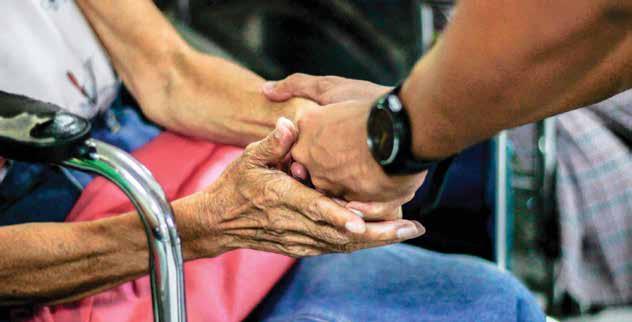
When the Methodist Social Principles refer to Community Life, they mean the community and society at large, not just Methodist communities. And Methodists are called to be active members of society.
When John Wesley gathered together people in Methodist groups, he reminded them of two circumstances of their situation then.

One was that they were "a low, insignificant people … without riches, (for you are poor almost to a man, having no more than the plain necessaries of life,) and without either any extraordinary gifts of nature, or the advantages of education". 1
The other was that "whereas every other religious set of people, as soon as they were joined to each other, separated themselves from their former societies or





congregations; you, on the contrary, do not; nay you absolutely disavow all desire of separating from them". He was, of course, referring to the circumstances of his day.
Wesley wrote this to warn Methodists that, because they remained in civil society, they would offend many people by their principles and their very name.


The Methodists tried to improve their situation and help out others in their
Over time, Methodists have generally become more affluent.


But his reminder shows clearly that early Methodists were poor, uneducated and very much a part of their communities.

So, to help out those early poor Methodists and their communities, Wesley put in place several innovations: He started a micro-loan scheme called the Lending Stock giving out loans of up to £1; he ran a Medical Assistance programme with a surgeon and an apothecary to dispense medicine; he opened The Poorhouse for widows and poor children; and he began Little Societies for children for their instruction and exhortation.
In 1748 in Bristol, Wesley opened the Kingswood School, today the world's oldest Methodist school. Later, in Britain, Methodists helped start trade unions and the Labour Party. 3 Methodists were members of the Tolpuddle martyrs, a persecuted trade union of farm workers.4
In Singapore, the Methodist Church (and churches in general) attract middleor upper-middle class congregations. Methodists are still very much a part of Singapore society. And we also work hard to build community and improve society.
We run 15 schools and about a dozen preschools in Singapore, providing education to over 20,000 students. In addition to the efforts and initiatives of local churches sponsoring Family Service Centres and Senior Activity Centres, we have the Methodist Welfare Services running nursing homes, homes for children and the destitute, a senior care centre and a shelter for women.
We provide home care and hospice services. All these regardless of race, language or religion. We do this because we believe that the aged, the children and the disabled have particular rights in society, and our Social Principles make these clear.

















We continue to champion these rights by helping out others in our society.


We also believe that women have equal rights with men. In Wesley's day, only men could vote, be elected to public office and be ordained. But even then the Methodists allowed women to be leaders and preachers in the movement. In 1866, the Methodists ordained our first female minister. In 1980, Methodists elected our first female bishop. Today, when the British Methodist Conference elect their president and vice-president, they choose at least one woman. In Singapore, we regularly and happily ordain female ministers.
In fact, it is not just women but every person that has equal worth in God's sight.
Our Methodist Social Principles recognise that Singapore is a multiracial, multi-cultural and multi-religious society and stress that Methodists "seek to work towards societies in which each person's unique value is recognised, affirmed and strengthened".
To this end, we believe in open dialogue with persons of other faiths and we affirm the right of other religious groups to exercise their faith. All of us have
the right to share our faith "without misrepresenting the faiths of others".





Methodist ministers sit on Inter-Religious Confidence Circles throughout Singapore and work for and ensure multi-racial and multi-religious harmony.
We do all these to better society and Wesley said that the world is his parish, World Methodist Evangelism , says that a parish is organised for three things: Firstly, it provides a Christian presence for all. Secondly, it provides care for all. Thirdly, it strives to make the local church part of a larger community. 6 That is what the Methodist Church tries to do in Singapore.

1 "Advice to the People Called Methodists" in John Emory, The Works of the Reverend John Wesley, A.M., Volume V (New York: T. Mason and G. Lane, 1839), pp. 250-251.
2 Emory, Works , p. 251.
3 "Our Heritage of Social Action", The Methodist Church , Trustees for Methodist Church Purposes, n.d., https://www.methodist.org.uk/ action/our-heritage-of-social-action/
4 See Tolpuddle Martyrs Museum, Tolpuddle, Dorset, 2024, https://www.tolpuddlemartyrs. org.uk/story/meet-the-martyrs
5 "The Sphere of Community Life", The Book of Discipline (Singapore: DRC, 2022), ¶87 and ¶87 (c).
6 Rob Haynes, "The World is Our Parish", Memphis, TN, n.d., https://worldmethodist.org/ the-world-is-our-parish/
This article was first published in Salt&Light on 29 April 2024.

Dr Roland Chia is Chew Hock Hin Professor of Christian Doctrine at Trinity Theological College and Theological and Research Advisor at the Ethos Institute for Public Christianity.
One of the most distinctive contributions of Roman Catholic moral theology is the enumeration of what is now known as the "seven deadly sins". The origins of the list can be traced to Pope Gregory I (540–604), although it was later developed by the great 13th century medieval theologian, Thomas Aquinas.
One of the sins in Thomas' list is "sloth", which is broadly defined as physical and spiritual idleness (the other six are: pride, greed, lust, envy, gluttony and wrath).
Thomas describes sloth as "an oppressive sorrow", a "sluggishness of the mind which neglects to do good." 1
Christians of all stripes would agree that sloth is indeed a sinful attitude and disposition. The Bible, especially the wisdom literature of the Old Testament, has chastising words to say about the slothful (Proverbs 10:4–5; 12:11, 24; 13:4; 19:15).
There is, however, another "deadly" sin which is often neglected by Christians. In fact, some Christians have even regarded this vice as a virtue and applaud those who are engaged in it.
I am referring to the sin of workaholism.
The term workaholic was first coined in 1968 by a renowned American psychologist, Wayne Oates. Workaholism points to a person's disordered attitude towards and relationship with work, which results in noticeable harm to health, interpersonal relations and social functioning. 2
The harmful consequences of workaholism are well documented.
Studies have shown that workaholism is a form of addiction because it displays many of the symptoms found in other forms of addiction such as tolerance, withdrawal, conflict, salience, relapse, and mood modification. 3 In addition, there is also ample evidence that workaholism adversely affects physical and mental health and increases work-family conflict.
But in what sense can we designate workaholism as sin?
Before we deal with this question, it is important that we understand the distinction between workaholism and diligence or hard work.
Over the years, I have written a few articles on what may be broadly described as a theology of work for this publication, where I have repeatedly stressed that as Christians, we should regard the work that we do as a vocation to which God has called us.
I have also said that we should think of our daily work as an act of worship. As Christians, we should take heed of the admonishment of the apostle Paul: "Whatever you do, work heartily, as for the Lord and not for men" (Colossians 3:23).
Workaholism must not be confused with discipline and industriousness, which is so foundational to the Christian work ethic. It is not about the work that we do, the effort we put into our work, or the amount of time we spend at work.
It is much more subtle, because it has to do with our attitude towards work. It is about the way in which work and thinking about work consume us in a pathological manner which makes everything else—our family, our friends, our ministry, even God—seem unimportant (or not quite as important as our work).
As a vice, workaholism is the perversion of the virtue of diligent and hard work.
Some writers have argued that workaholism is a form of idolatry. There is merit to this association because some workaholics love their work so much that they give it their supreme devotion.
However, not all workaholics love their work! Some allow themselves to be consumed
by work because for them, it is a form of escapism, of bracketing away other concerns, vicissitudes and responsibilities.
This invariably results in delusion and bondage. We might say that it causes the workaholic to live a life of unreality.
All this is shown to have serious consequences for significant relationships. For example, it may put a strain on the family.
At first blush, the sin of sloth and that of workaholism may appear to be very different. However, upon closer inspection, there is an important feature that both of them share. Both can be characterised as an acute failure in the exercise of responsibility.
The slothful avoids taking responsibility for himself and for others. The workaholic, immersed in and consumed by his work, commits the same offence: he fails (or refuses) to act in a responsible manner towards others (e.g. his spouse and children), and ultimately, towards God.
In a sense, we may say that both sloth and workaholism are in their own ways sins of omission, which fundamentally have to do with neglect.
While Christians are encouraged to take their work seriously because it is their Godgiven vocation, they must also beware of the disordered preoccupation with work. For like sloth, workaholism is also "an oppressive sorrow".
1 Thomas Aquinas, Summa Theologiae, II-II, 35, 1.
2 Mark Griffiths, "Workaholism: A 21st-century addiction," The Psychologist 24, no. 10 (2011): 740.
3 Cecilie Schou Andreassen and Stàle Pallesen, "Chapter 96. Workaholism: An Addiction to Work," In Neuropathology of Drug Addictions and Substance Misuse Volume 1, ed. Victor R Preedy (Academic Press, 2016), 972-983.


ACS (International) Singapore is a distinctive international secondary school open to all Singaporeans & other nationalities, offering an all-round English-based education for students aged 12 to 18 years leading to the International General Certificate of Secondary Education (IGCSE) and the International Baccalaureate Diploma Programme (IBDP)







• Exceptional examination results, strong value-added achievement and an all-round holistic education
• 50:50 mix of local and international teachers who uphold the dual Methodist ethos and ACS heritage
• Small class sizes with overall student-teacher ratio of 8 7 : 1
• 40 different CCAs – 16 Sporting, 12 Visual and Performing Arts, 12 Special Interest Groups
• Over 200 formal student leadership positions
• Scholarships for four Singaporeans to undertake the IBDP




• Students with perfect score of 45 points in IBDP
• 23 “Top in the World” awards in IGCSE examinations over each of the past twelve years
• Students accepted to Oxford and Cambridge universities for the past eight years
• Admissions to top universities in the UK, the US, Australia and Singapore
• PSLE and GCE ‘O’ Level students obtaining outstanding value-added examination results for the IBDP and improved pathways to good universities
• Successes at national level in Athletics, Touch Rugby, Debating, Orchestra, Volleyball, Taekwondo, Ice Hockey, Fencing, Swimming, Artistic Swimming, Rhythmic Gymnastics and Wushu
Chern Siang Ling is the Regional Director for Cambodia, Nepal and Vietnam at Methodist Missions Society. She is a member of Kampong Kapor Methodist Church and previously served as a Lay Executive Staff there after a season as a missionary.
Mental health issues in the workplace are such an important concern nowadays. Whether it is open articulation or implicit concurrence, when one talks about the workplace and mental health, the word "stress" comes to mind.

One of the reasons why we are placing more emphasis on mental health issues in the workplace is that the stresses there have
increased exponentially over the years. We are doing things faster with emails and chat group platforms. Gone are the days when it takes a few days to receive a reply via mail or fax, and that was considered a quick response to an enquiry in those earlier times. The runway to meet work deliverables keeps getting shorter and shorter as we strive to achieve more within a given time. These are but some of the stresses in the workplace.
























































































Going out into the mission fields is also highly stressful, and serving as God's missionaries in a cross-cultural setting can be immensely challenging. Missionaries deal with manifold stresses. You have to enter into a foreign culture and learn a foreign language to identify with the people that God has called you to love. There are uncertain environments where you are required to move from place to place to bring the gospel to unreached people. For others ministering in creative access nations, you need sensitivity and wisdom to navigate tense political climates. Missionaries have to learn to operate within all these stresses and serve God's call with oftentimes limited resources at their disposal. The elements causing stress may be different in the mission

fields from that of the workplace, but it is stress nonetheless and it has an impact on mental health.
When missionaries encounter mental health issues, their stress levels are compounded as it could be a stigma to share such challenges with their supporters. Concerned over possible repercussions, they may choose instead to keep such mental health issues to themselves. For those serving in remote places, there may not be easy access to counselling and treatment.
The apostle Paul, the missionary par excellence, embraced his fair share of stresses while responding to God's call to bring the gospel to the Gentile nations. In

Open daily: 8am-8pm | Public Holidays: 9am-2pm
• Located next to Commonwealth MRT Station
• 99-year lease commencing from 1964
• Clean and peaceful environment
• Transfer of urns or exhumation can be arranged
Single and double niches are available with the following donations:


REGISTER AT OUR COLUMBARIUM OFFICE
400 Commonwealth Drive Faith Methodist Church Queenstown Chinese Methodist Church (Level 5)
Open Monday to Friday, 9am-5pm (Closed on Public Holidays)
Tel : 6479 8122 | HP : 9670 9935 Fax: 6479 6960 Email: gepc400@gmail.com
For booking of niches, please contact the columbarium office to arrange for an appointment.
2
Corinthians 11:23–28 (NIV), Paul recounted what he had been through:
"… been in prison more frequently, been flogged more severely, and been exposed to death again and again … beaten with rods, once I was pelted with stones, three times I was shipwrecked, I spent a night and a day in the open sea … in danger from rivers, in danger from bandits, in danger from my fellow Jews, in danger from Gentiles; in danger in the city, in danger in the country, in danger at sea; and in danger from false believers. I have laboured and toiled and have often gone without sleep; I have known hunger and thirst and have often gone without food; I have been cold and naked … I face daily the pressure of my concern for all the churches."
If this is not intense stress, I do not know what is. Yet, this same Paul offers us guidance to deal with stress. From Paul's teachings, we can gain three important postures about managing stress with God's help.
The first posture is to "Take it to God". When we are overwhelmed, we need to remember that we have our Abba Father who is with us and can help us. We can take our stresses to God in our supplications and prayers. Paul, in Philippians 4:6–7, tells us that we can always take all our pressing situations to God and present our needy requests to him. Our Heavenly Father hears our prayers and gives us peace, a peace that goes beyond all understanding.
Prayer and supplications are closely related to the second posture, which is to "Turn to God". When we are inundated
with a sense of helplessness, we need to know that we are carried by a pair of very big and loving hands. Paul, in 2 Corinthians 12:7–9 (NIV), alluded to a matter that he could not solve, not even with constant supplications and earnest prayers. Three times he asked the Lord to remove the "thorn in [his] flesh". But the Lord said to Paul that his grace is sufficient. God carries us in our helpless state as he empowers us through his grace. God wanted Paul to rely on him, and God wants us to do the same, especially in our stressful circumstances. As Paul had experienced God's grace, we too will find our strength in Christ to help us overcome.
Every stressful moment we encounter is an opportunity to learn to trust God. "Trust God" is a recognition that God is sovereign over all circumstances, over all people, and over us and our stressful situations. This is the third posture that Paul taught the early church as he demonstrated this spiritual reality in his life and ministry. In Romans 8:28 (NIV), Paul encouraged the Roman church: "And we know that in all things God works for the good of those who love him, who have been called according to his purpose."
Before I responded to God's call to serve in the missions field, I was working in a statutory board where many demands were made of its officers. As with the government service stint, and then on the missions field, and now with a missions agency, I have found these three postures helpful to mental health and the workplace. We do not need to be intimidated by the stresses in our workplace. As God is our help, the stresses at the workplace are the refiner's fire that purifies our faith and draws us closer to God.

When the Covid-19 pandemic struck and Singapore introduced the circuit breaker in April 2020, Bobby*, who worked in the banking sector, still had to report to the office to manage daily operations. His parents and parents-in-law, who normally helped care for his young children before the pandemic, were unable to assist during this time. Balancing work responsibilities and family life became exceptionally difficult for Bobby and his wife.
"Limited social interaction amid the unpredictable Covid-19 situation took a heavy toll on my mental health," Bobby recalled. "At the same time, our third child had just been born and was constantly crying. There was growing tension between my wife and mother over how to care for the newborn, and I felt caught in the middle. All these stressors pushed me to the brink. One night, I went for a drive, seriously contemplating how to end my life."
Eventually, Bobby realised that he needed help to cope with the strain of being caught between his wife and mother. In August 2022, he reached out to MWS Covenant Family Service Centre (CFSC) – Buangkok for support.
During counselling, Bobby's social worker, Noel Chye, discovered that he was grappling with persistent suicidal thoughts while also trying to manage conflicting needs at home. The MWS CFSC team referred him to the Strengthening Families Programme@ Family Service Centre (FAM@FSC) run by MWS, and Noel collaborated with counsellor, Anny Rodjito, to provide holistic support for Bobby's well-being.
"At that time, even with all my experience mentoring and counselling youth at risk, I felt completely lost when it came to my own struggles," recalled Bobby, who is in his 40s and an active community volunteer
Counselling offers a pathway to healing and growth for individuals and families
dedicated to guiding youth at risk and collaborating with grassroots leaders to drive positive change in his local area. "Noel worked with me to create a safety plan, including calling Samaritans of Singapore (SOS) if I ever had thoughts of self-harm."
"Sometimes, you just need a neutral person to talk to," Bobby continued. "Noel and Anny supported me emotionally by listening and asking the right questions that prompted me to reflect on my value to my family and the community."
Through her conversations with Bobby, Noel uncovered that he had experienced relational trauma during his formative years. The adults in his life often rejected him emotionally and criticised him, which deeply damaged his self-worth. This led Bobby to believe he was useless and unwanted, with suicidal ideation becoming his way of coping.
"Our sessions created a safe space for Bobby to understand the impact of his childhood trauma," Noel shared. "Bobby's courage to seek help led him to realise that suicide isn't the only way to end his pain. He has become more self-compassionate and developed healthier coping mechanisms."
To help reconcile his mother and wife, Anny worked with Bobby to manage his emotions, enabling him to guide conversations between them more constructively. "This helped him to remain grounded and neutral while mediating, understanding both perspectives without taking sides or feeling overwhelmed," Anny explained.
"This neutrality created a safe space where both parties felt heard, reducing tension, fostering open communication, and supporting the healing of their relationship."
It has been more than a year since Bobby last experienced suicidal thoughts. The lessons he learned in counselling—
valuing his contributions to his family and community and appreciating his loved ones—continue to keep him grounded.
Bobby also finds purpose in his roles as a community advocate and mentor for youth, recognising the positive impact he makes. He now sees himself as someone who deeply cares for his community and is wholeheartedly devoted to his family.
"Counselling helped me recognise my strengths, like having compassion and openness to people with different needs," Bobby shared. "I want to keep supporting my community, mentoring youth and passing these values on to my own children."
*Not his real name
If you feel that you are unable to cope and have thoughts of harming yourself or someone else, please contact SOS 24-hour hotline 1767, or their 24-hour SOS CareText via WhatsApp 9151 1767
If you feel you may be at immediate risk of harming yourself, call 995 or approach the A&E department of your nearest hospital.
If you or any person is experiencing family violence or other forms of abuse or neglect, please contact the 24-hour National Anti-Violence and Sexual Harassment Helpline at 1800-777-0000 .
If you are experiencing any risks of physical violence, please know that you can walk into your nearest Family Service Centre (FSC) to request for help. You can locate your nearest FSC by entering your postal code on this website: www.msf.gov.sg/ourservices/directories

To learn more about MWS' work, visit www.mws.sg, or to support us, go to https://mws.sg/give


Benny Bong has over 40 years of experience as a therapist, counsellor and trainer. He also conducts regular talks and webinars. Benny has helmed MM’s You & Your Family column for more than 17 years and is a member of Kampong Kapor Methodist Church.


Rev Tay Li Ping is currently pastoring at Christalite Methodist Chapel. Trained as an Industrial-Organisational Psychologist before becoming a pastor, Rev Tay is particularly interested in the intersection of Psychology and Theology. She is married and has five sons.
Need advice? Scan the QR code or visit https://www.methodist.org.sg/mm-atthe-well/ to submit your question. Due to space constraints and repetition of topics, we may not be able to feature all questions submitted.
I'm in my 30s and currently seeing a guy in his late 40s. I really enjoy his company and he is wonderful in many aspects. However, he displays some narcissistic traits and has inflated his credentials and background. He lied about his age and had two previous marriages which he did not disclose. I get the sense that he might be insecure and may have been hurt by his previous relationships. Should I continue seeing him? How can I encourage him to be truthful? Can I truly love someone who is broken and a narcissist? B
Benny says
Dear B,
It sounds like there are a few "red flags" that have been raised in this relationship—not being truthful is a big one. This is especially when it concerns rather critical areas of his past, such as his two failed marriages. Not being honest about his credentials and age might be forgiven as a person wanting to put on his best front. But leaving out such big details in one's life is a serious oversight.
Also, to have had two failed marriages begs the question of what his role was in their breakdown. If he were to give you an explanation, would you believe his account?
Your mentioning of the possibility of him being "broken" and a "narcissist" seems to indicate that you have several strong misgivings about moving forward. On the other hand, persons with narcissistic inclinations can be rather attractive.
My staff can't seem to work independently
I supervise someone at work. She has been in this role for almost 20 years. While I try to empower and not micromanage, I have realised that she is often not able to work independently and/or think proactively about improving work processes. How do I encourage or help her to understand that she has to think more independently instead of having me tell her what to do?
the reluctant supervisor
Li Ping says Dear the reluctant supervisor,
There are two separate issues that might be at play in your subordinate's behaviour: (1) ability, whether she has the necessary skills and aptitude to perform; (2) attitude, whether she is motivated to do so.
An important step in ascertaining if her issue is ability and/or attitude is communicating your expectations clearly to her. In addition, in your communication of expectations, delegate areas of responsibility, rather than just tasks. Hold her accountable to clear, measurable and time-bound goals or outcomes.
Beyond communication, strong work relationships go beyond casual interactions. Communication and relationship are provided through a supervisor's care and coaching. When a subordinate knows that their supervisor cares about them, they are more willing to care about your mission and work goals. Their ability and willingness to do the work is further enhanced when they are





coached on how to stay on track and remove obstacles that they are facing.
The following is a five-question model you can use in regular one-on-one check-ins with your subordinate that allow you to both care for and coach her.
1. How are you doing?
2. Is there anything I can do to help you?
3. What are you working on right now?
4. What obstacles are you facing?
5. Is there anything I can do to help you accomplish the goals we set?
The first two questions engage her at a personal level first before work. People bring their whole lives to work. If things are not going well at home, it will follow them to the office. You may not be able to solve their personal problems, but listening to them, caring about them and encouraging them can go a long way. You can also recommend counselling or resources to help if it seems appropriate.
The third question is meant to check on the previously decided upon goals or priorities.
The fourth question separates the person from the problem and gives her the chance to succeed. This is the time to coach, encourage and problem-solve with your subordinate.
The fifth question communicates that you are there to provide her with the support, resources or training needed to get her work done.
If, despite doing the above for a while, your subordinate is still unable (ability) or unwilling (attitude) to meet your performance expectations, then you may need to carefully consider if she needs to be transitioned to a different portfolio or even out of the position.
This is Rev Tay Li Ping's last month with At The Well. Methodist Message thanks her for her valuable time and advice. Stay tuned to see our new panellists in the next issue!

When asked some months ago to conduct a workshop on relationships with inlaws, I was both intrigued and challenged. I was intrigued because I had only recently entered the phase of becoming and acquiring in-laws. I was challenged because although it is an important topic, as reflected in the number of clients who have come for counselling for in-law woes, not much research or material has been written about it.
So let me share some of the learning that came out of preparing for the workshop and interacting with the 60 or so persons who attended. The organisers and I had initially thought that only older parents and grandparents would be interested but we had a good number of younger adults, some of whom were not married yet but asked to attend.

Benny Bong has over 40 years of experience as a therapist, counsellor and trainer. He also conducts regular talks and webinars. Benny has helmed the You & Your Family column for more than 17 years and is a member of Kampong Kapor Methodist Church.

past loyalties and priorities to one's family. Parents need to be mindful of this too and allow their adult children to deepen the marital bond as well as to establish good relations with their parents-in-law. An application of this principle may be for the parents to let the couple decide when and how often they visit either side of the family.

My first realisation was that we often have little choice in our in-laws. Couples entering marriage choose each other, but the in-laws come as a package deal—get one and the whole clan comes along free!
Although we do not choose our in-laws, what is within our control is how we relate with them. The quality of the in-law relationship is important and goes beyond putting up a friendly front. Moreover, a good relationship with one's in-laws does impact the married couple's relationship. Therefore, it pays to have good relationships all around.

One of two important lessons taught to most couples preparing for marriage is the principle of "leave and cleave". Couples are reminded that marriage creates a new bond which should take precedence over


I have found that this principle is not too difficult to observe in the early years of marriage. After all, it comes hot on the heels of the couple's heady courtship period where parents often give them a wide berth. But the boundaries around the couple's lives get quickly challenged after they have children. This is when grandparents, on both sides, may find the grandchildren simply too irresistible. Here again, the principle of "leave and cleave" should apply. Grandparents need to leave (give sufficient space), to allow the grandchildren to cleave to their parents.




For some families this may seem difficult, especially when grandparents may be mobilised to help with caregiving. Even when the grandparents spend the lion's share of their grandchildren's waking hours with them, they would do well to encourage the grandchildren to bond with their parents when they can.
The mobilisation of grandparents can also be awkward when one side of the in-laws seems to be preferred over the other. The allocation of caregiving duties should not be seen as a competition to see who is more sought after. Thus, in-laws should try not to feel hurt by not receiving calls for assistance. Neither should they put the parents on a guilt trip by implying that the grandchildren seem to "prefer the other Ah-kong or Ah-ma".


The second important principle for couples is not to be unequally yoked. This principle is often discussed in the context of marrying someone outside of the same faith. It is hoped that with the same faith comes similar values, mindset, etc.


I like to extend the wisdom of this principle to the binding of two families through marriage. This is because marriage is not just about two persons but of two families with their different traditions, histories and backgrounds getting together. Inlaws would do well to liken their coming together to a merger of two business entities for mutual benefit rather than a hostile take-over of one by the other.
Smoothening such unions can be delicate if the two families are unequally matched. For instance, one family may be perceived as socioculturally superior by virtue of their higher financial or societal standing. Even if the family concerned does not want to be considered superior, there may be deference or giving way to them, awkwardness in interactions or tendency to seek and hear their opinions on issues.
Let me be clear—there is nothing wrong with possessing greater wealth or being in a privileged position. But like all blessings God bestows on us, let us be good stewards. The privileged ones should try their best to not flaunt their wealth or advantage. They could also allow for a more equal participation from both sets of in-laws, e.g. hearing others out before volunteering their views.

A final word on maintaining good relationships with in-laws is to approach it with a long-term view. Like some relationships, the beginning may be awkward; there may even be some faux pas committed. But with time and a good dose of patience and Christian love, there can be a greater meeting of minds and hearts.


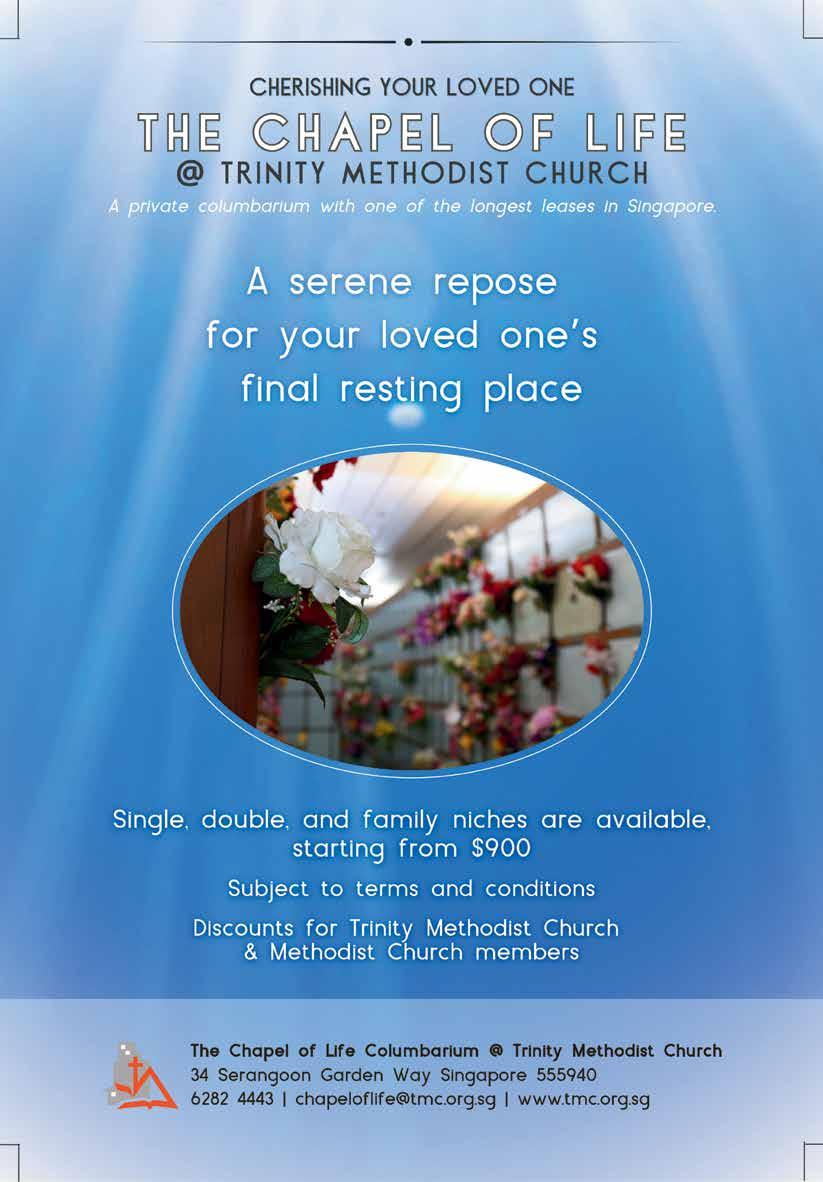
Amelia Koh is a Senior Programme Executive (Worship & Church Music) at the Methodist School of Music. She worships at Fairfield Methodist Church and serves in the worship ministry as Choir Director.

I just wanna speak the name of Jesus ‘Til every dark addiction starts to break … over fear and all anxiety To every soul held captive by depression …
~ I Speak Jesus by Jesse Reeves, Raina Pratt, Abby Benton, Carlene Prince, Kristen Dutton and Dustin Smith, 2020
When I first heard the song I Speak Jesus, the lyrics struck me for their novelty. Words like "addiction", "anxiety" and "depression" usually do not appear in contemporary worship songs. Most of the time, we would sing about God’s greatness, goodness and sovereignty over our trials. Mental health issues do not get specific mention.
Perhaps this needs to change. According to the National Population Health Survey released in 2023, the prevalence of poor mental health in Singapore rose from 13.4 per cent in 2020 to 17.0 per cent in 2022. Furthermore, young adults aged 18 to 29 had the highest proportion of poor mental health at 25.3 per cent. In other words, there will be an increasing number of people in our churches with mental health concerns.
While many churches have already responded pastorally to this issue, we might also want to explore how, we, as the body of Christ, can engage with these concerns in our worship practices.
As Dr John D Witvliet, the director of the Calvin Institute of Christian Worship, put it: "What we say or fail to say about these challenges in worship settings can be profoundly formative for how Christian communities respond to these challenges. Further, decisions we make about how to shape and lead worship can do a lot either to welcome or to inhibit the participation of those among us who struggle with these concerns."

With this in mind, incorporating hymns and songs that address mental health concerns can be a meaningful step. Additionally, churches might consider incorporating elements such as:

Psalms that provide the words for an honest, unhindered time of crying out to God may help members struggling with mental health issues express their heartfelt burdens before God. Embracing these psalms in worship also acknowledges God’s graciousness and mercy in accepting us as we are.

Prayers that specifically bring various types of mental illnesses and disorders before God, coupled with an awareness of different kinds of mental health challenges, could mean a lot to those who are struggling.

A congregation who understands suffering not as a simplistic consequence of individual sin or faithlessness, but as an inevitable part of the Christian life will be more hospitable towards those whose mental anguish is understood by few.
By thoughtfully considering these approaches, our churches could become more of a refuge for those experiencing mental distress—a place where they find peace and love, rather than judgment.

For I am convinced that neither death nor life, neither angels nor demons, neither the present nor the future, nor any powers, neither height nor depth, nor anything else in all creation, will be able to separate us from the love of God that is in Christ Jesus our Lord.
Romans 8:38–39

Adelene Chan is constantly on the lookout for new faces or new "old faces" in her home church, Fairfield Methodist Church. / Photo courtesy of Adelene Chan
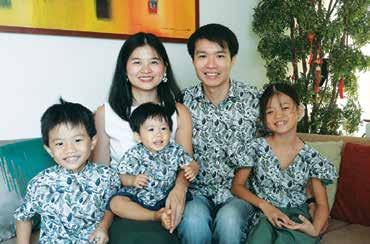
My family was raised in Fairfield Methodist Church (FFMC). I have been here all my life, save for three and a half years when my husband was posted overseas. After returning, we asked ourselves if FFMC was still the church for us. We sought a more vibrant community, but God didn't tell us to leave.
Meanwhile we had our first child, and it was easier to stay for familial support. However, the thought of leaving didn't disappear. As we prayed about it, God compelled me to pray with others for my generation instead—I was about to turn 30 and many had left. What
Kopi kakis
by Lau Peng Leong, Yen Tun I and Zachary Yong
would happen in 30 years if young adults (YA) continued leaving? Yet what difference could I make as one who stayed?
Over five years of praying, we had another child and then Covid-19 disrupted routines. I was losing sight of the larger picture, struggling to see what could change.
In late 2022, God surprised us with a constant stream of YA visitors. Two dear friends, who obeyed God to lead a YA cell, initiated a gathering in early 2023 for new and old YAs. That led to five more mixers over 15 months, building a deeper connection to FFMC.
In other exciting news, many in my generation are also returning. Some lived overseas, others were not in church. It's my goal to welcome them, as I know the feeling of returning to a community familiar yet strange.
So while I was raised here, it's time to take ownership and rebuild a connected, vibrant community. God answered prayers and brought people (back) to FFMC, so I'm convicted to put my hands to the plough for them and his glory.


12, 19, 26 October (Saturdays), 8.30 a.m. – 1.00 p.m.
Trinity Theological College (TTC), 490 Upper Bukit Timah Road, S678093 Register via https://www.ttc.edu.sg/english/study-at-ttc/equip-registration
$150 (Standard Registration), $75 (Spouse of Current Matriculated TTC Students), $37.50 (Youth [aged 21 and below], Full-time National Servicemen) Free for TTC Alumni/Current Matriculated TTC Students (Registration Required )

Please note that participants must attend all 3 sessions and pass the course assignments to complete each workshop.
This course is for anyone concerned for and involved in youth ministry as youth leaders, adult volunteers, parents, church leaders, or pastors. We will explore how our youth ministries can get unstuck, reach the missing youth, see young people differently, empower youth, change our focus away from programmes, partner with others and engage youth today in digital and other spaces.
This workshop speaker is Rev Dr Bernard Chao, who is Director of EQUIP and Lecturer in Practical Theology at TTC. He teaches courses in Christian leadership, Christian education, youth ministry and Wesleyan theology. He has been an ordained minister with The Methodist Church in Singapore (Trinity Annual Conference) since 2005.
Organised by EQUIP
14 October (Monday), 2.00 p.m. – 5.00 p.m.
Kuehn Hall, Fairfield Methodist Church, 1 Tanjong Pagar Road, S088437

For details, visit https://www.methodist.org.sg/mcevents/does-god-really-care-trac-bosm/ or email TRAC_BOSM@trac-mcs.org.sg
Free

The speaker for this session is Jason Wong. Jason founded two national movements in Singapore, namely the Yellow Ribbon Project in 2004 and the Dads for Life movement in 2009. He had spent 23 years in public service, working with prisoners, abused children, and youths at-risk. Since leaving public service more than 10 years ago, he has been championing family, mentoring fathers and young men. Three years ago, he initiated One for Jesus, to encourage every Christian in every church to bring at least one person to Jesus. Jason is married with two adult children.
Organised by TRAC Board of Seniors Ministry
9 November (Saturday), 9.00 a.m. – 12.00 p.m. Jalan Besar Active Ageing Centre, 811 French Road #01-112, S200811 Register by 18 October via http://cru.sg/luvinaction
Send your enquiries to loveverdun@cru.org.sg

Are you looking for a way to serve the vulnerable and disadvantaged? Come join us in experiencing the joy of serving our community!
Your support, through volunteering your time or contributing your finances, will:
• Enhance the living conditions and safety of these vulnerable individuals
• Alleviate social isolation by fostering a sense of community and care
• Promote healthier and more dignified living among the elderly.
• Model love in action for your children, disciples or cell group (so jio them along!)
Help is needed in the following areas: Cleaning designated areas | Befriending the seniors | Distributing gifts | Donations
Organised by LoveVerdun, the community outreach arm of Cru Singapore